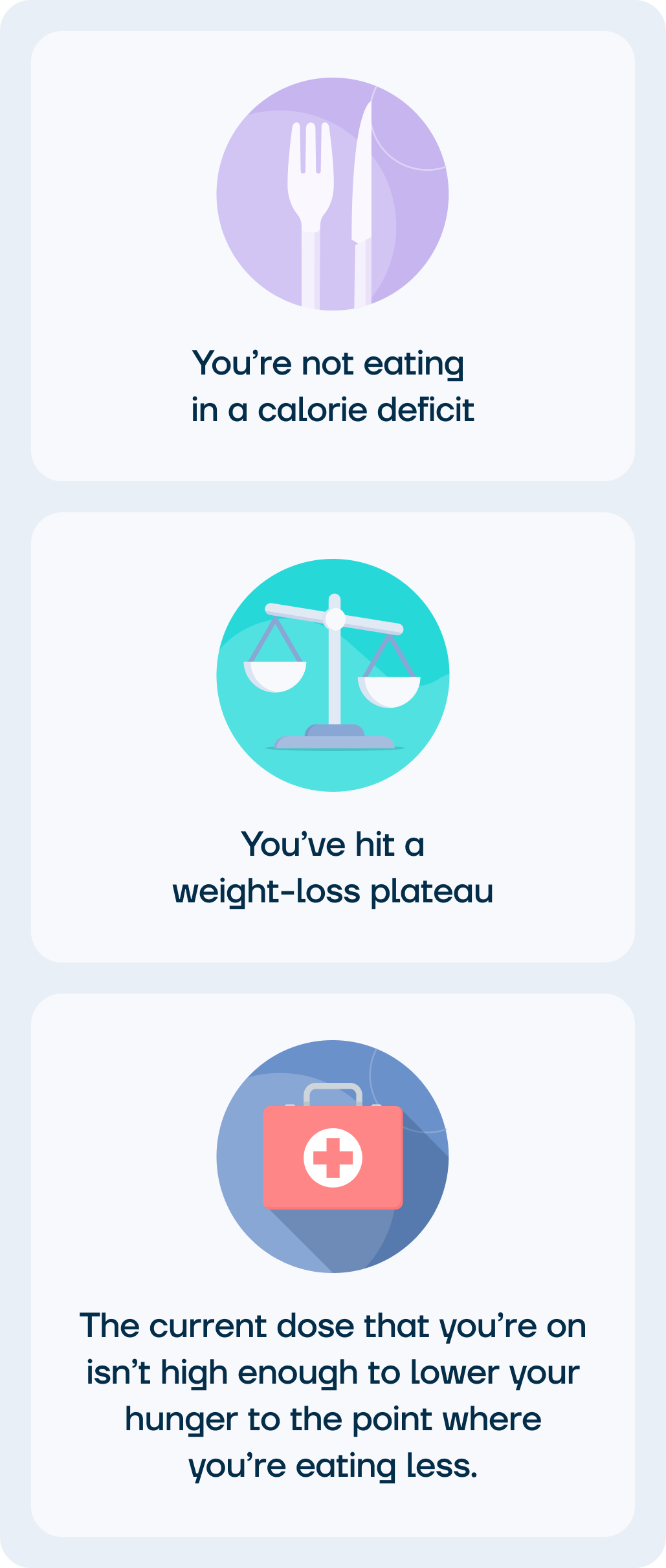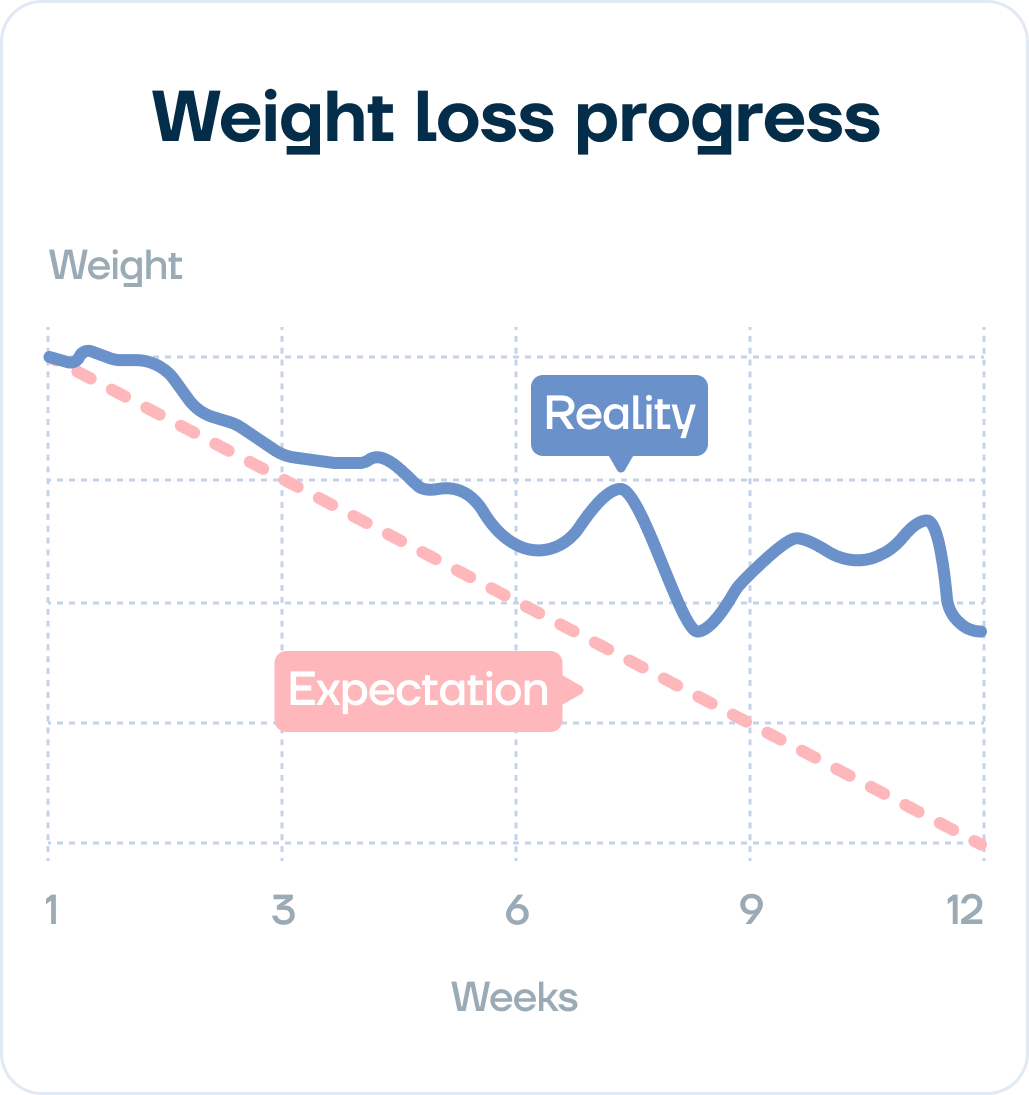Jump to: How do you maximise weight loss on Mounjaro? | 1 – You’re not eating in a calorie deficit | 2 – You’ve hit a temporary weight-loss plateau | 3 – Your current dose isn’t high enough to promote lower hunger
The reasons why you’re not losing weight on Mounjaro might be that you’re not eating in a calorie deficit, you’ve hit a temporary weight-loss plateau, or the current dose that you’re on isn’t high enough to lower your hunger to the point where you’re eating less.

Not everyone responds the same way to Mounjaro (tirzepatide), and other factors may also contribute to a weight-loss plateau, such as other medications or health conditions impacting our ability to lose weight.
It’s also important to note that the clinical trials of Mounjaro were run with participants undergoing lifestyle changes, i.e., improving their nutrition, exercise, and sleep.
To maximise your weight-loss results and improve your health, it’s important to focus on creating new healthy habits while taking Mounjaro. To the extent that we’d say there’s no point taking Mounjaro unless you also change your habits.
How do you maximise weight loss on Mounjaro?
To maximise weight loss on Mounjaro, you must build healthy habits like eating a healthy diet, sleeping well, and moving more.
Mounjaro, and other weight-loss injections like Wegovy, are most effective when combined with developing healthy habits.
Research suggests when people come off of GLP-1 medications after being on a habit-change programme, they’re more likely to keep the weight off in the long run.
Second Nature’s Mounjaro weight-loss programme has been developed by nutritionists, psychologists, and dietitians to help you build healthy habits to lose weight and lead a life of independence without needing medication or physical aids.
1) You’re not eating in a calorie deficit
The evidence is clear: we must eat within a calorie deficit to lose excess body fat. When we eat below our energy balance, our body has to find the energy required to fuel our body’s primary functions by burning excess fat.
Mounjaro works by interacting with the brain’s appetite control centre, the hypothalamus, to lower hunger and food-seeking behaviours.
Research suggests that Mounjaro can reduce our energy intake by around 31% compared to individuals not taking Mounjaro.
However, we eat for more reasons than physical hunger, and some people might continue to eat enough food that prevents them from achieving a calorie deficit due to psychological, environmental, or habitual reasons.
Additionally, suppose our baseline diet was rich in ultra-processed foods and refined sugars, and we continue to eat this way whilst on Mounjaro. In that case, we may still eat more calories than we need to lose weight.
So, it’s essential we transition to a diet based on whole foods to maximise the results of Mounjaro.
Key points:
- We need to eat in a calorie deficit to lose weight
- If our baseline diet is rich in ultra-processed foods and we continue to eat this way on Mounjaro, we may still consume more calories than we need to lose weight
- It’s essential to eat a diet based on whole foods to support sustainable weight loss
2) You’ve hit a temporary weight-loss plateau
Suppose we’ve lost some weight on Mounjaro, but then we hit a plateau, and we can’t budge the scales any more. In this case, we’re likely in a weight-loss plateau.
Weight-loss plateaus are extremely common, normal, and a necessary part of the weight-loss process. Being on Mounjaro doesn’t prevent us from experiencing weight-loss plateaus.

We have a full guide explaining weight-loss plateaus. However, as a quick summary:
- Our brain receives signals from many hormones, letting it know how much energy we’re eating and how much fat we have stored. We call this the brain’s ‘set point’.
- Weight-loss plateaus occur when our brain senses that we’re consuming fewer calories than normal and our fat stores are decreasing it ‘slows down’ our metabolism
- Evolutionarily, we’re wired to protect fat to ensure survival
- So, weight-loss plateaus are a survival mechanism in the brain to try and protect us from starvation
- Fortunately, we can gradually lower our brain’s set point by continuing to lead a healthy lifestyle and being consistent in our habits
Key points:
- Weight-loss plateaus are a necessary and normal part of the weight-loss process. Mounjaro doesn’t prevent weight-loss plateaus from occurring.
- Weight-loss plateaus occur when our brain senses we’re losing fat and eating less, so it slows down our metabolism to protect our remaining fat stores
- We can overcome weight-loss plateaus by being consistent with our healthy habits
3) Your current dose isn’t high enough to promote lower hunger
Mounjaro reduces appetite and hunger, helping you eat fewer calories; this effect is almost immediate when you start Mounjaro
However, you might notice the effect of lower hunger wearing off after 4-5 days post-injection in the first month of taking Mounjaro.
It can take 4-5 weeks for Mounjaro to reach a level in the body we call a steady state. A steady state is when the drug’s levels in the body remain consistent rather than spiking and falling.
Interestingly, this initial weight loss is no different to other weight loss treatments or the impact of diet interventions on weight loss. The real effect of Mounjaro is seen beyond three months.
Mounjaro is a long-acting medication that’s started at a lower dose to reduce the number and severity of side effects as it’s built up to a higher maintenance dose.
Additionally, we might find that our body adapts to the lower doses, and hunger can increase. However, we might find this reverses when we move up a dose.
Key points:
- The lower doses of Mounjaro can wear off after 4-5 days
- It can take up to 4-5 weeks for the medication to reach a ‘steady state’ where its levels are consistent in the blood
- Weight loss may be steady at the beginning but become more consistent as you increase your dose
Not a magic pill
Weight-loss injections are most effective when combined with a healthier lifestyle. They can help kickstart weight loss while you commit to developing healthier habits.
Mounjaro and other weight loss injections, like Ozempic and Wegovy, can allow you to make lifestyle changes to support long-term weight loss.
These medications can help silence food-related thoughts and give you a boost of confidence with more immediate weight-loss results.
They can also buy you the time and headspace to understand why your body may have struggled to lose weight and build new long-term healthy habits.
The core focus of our medication programmes is to calm down the feeling of food noise, lower your cravings, and allow you to build healthier habits to keep the weight off for good.
The ultimate goal is to make losing weight feel second nature.
Second Nature’s medication programme
Second Nature currently provides Mounjaro as part of our Mounjaro weight-loss programme.
Why should you choose Second Nature over other medication providers if you’ve decided to try Mounjaro (assuming you’re eligible)?
For peace of mind.
Second Nature has worked with the NHS for over 6 years providing weight-loss programmes across the UK.
While our Mounjaro weight-loss programme is private and not currently used by the NHS, we’ve built the programmes focusing on scientific evidence, patient safety, and data security.
We hope that our 6+ years of working with the NHS and building a track record of effective weight-loss results will give you peace of mind to give us a try.
Please note: We generally recommend speaking with your GP/doctor before you start taking any new medication like Mounjaro. If you do sign up for Second Nature's Mounjaro programme, then we'll also send your GP a letter to let them know you've started a medication-supported weight-loss journey.





